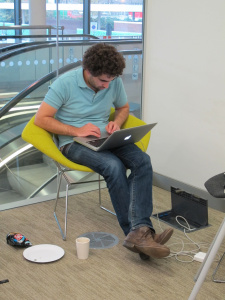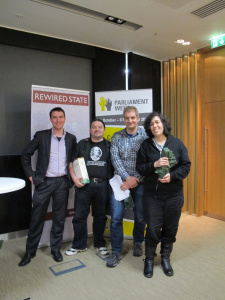Last weekend, I attended the closing session of a Parliamentary hack day run with Rewired State as part of Parliament Week 2011, a week of activities to engage with the public and encourage them to get involved in the UK's democratic institutions. The event clearly succeeded - there were some really excellent prototypes built in just over 24 hours.
Hack days are intense one- or two-day events that bring together a bunch of developers to build exciting or off-the-wall prototypes. Here at the Government Digital Service, we think hack days are awesome examples of how short development sprints from passionate coders can make a difference. They show that digital technologies can be used to fashion tools overnight that can provide easy solutions to fight wicked issues, or pose real, disruptive challenges to the existing ways of working and thinking.
There were 21 different projects presented on Sunday, with a wide range of fantastic tools - from mobile apps to help constituents talk to their MP, to APIs bringing together a range of information that Parliament provides into simpler, more joined-up ways that other tools can access. Parliament had brought along access to a great deal of data, including current and historical data, texts of Hansard, election results, allowances and constituency crime and unemployment data. The event featured 50 developers who gave up their weekend to hack away to create their prototypes, many of them working through the night. It was also superb to see that 15 of the developers were 18 or under, and indeed half the winning teams featured "Young Rewired Staters". Emma Mulqueeny, who runs Rewired State, wrote a guest blog post here last month about encouraging young people to get into coding, and this event demonstrated their different perspective.

The judging panel - Kerry McCarthy MP, Bryn Morgan (Director of Research Services in the House of Commons library), Tracy Green (Head of Online Services in Parliament) and Steve McGuinness (Second Clerk, House of Commons Science and Technology Committee) - awarded prizes in five categories:
"Better understanding of the work of Parliament"
The first award was for a tool that would help the public learn more about Parliament. Parliament.info, a site for people who don't need to understand Parliament to ask normal, "natural language" questions and get the answer back - such as "who is my MP in SW1A?" or "How did my MP vote on Iraq?", by 17-year-old Tom Shadwell.
"Better understanding of the work of Members"
The second project selected was for a prototype that helps people understand what Members (either Lords or MPs) do. This was given to Oh Lordy!, a great searchable system by Oli Wood holding the House of Lords' Register of Members' interests. The current system is published in sorted by individual Lords or as a computer-readable XML feed, but this tool lets people see all Lords who share financial stakes (the demonstrated example was focussed on Tesco, plc).
"Helping Members do their job better"
The third prize given was for a tool that makes it easier for MPs and/or Lords to work more effectively. Blogs for MPs, by Young Rewired Stater David Kendal, allows one-click instant blog posting for MPs to create blogs on what they had said in the House of Commons, or highlighting press coverage they had received. The demonstration was based on using Tumblr, though David said he was blog platform agnostic.
"Most likely to get you beheaded"
The much-coveted award for the most trouble-making project, this was given to Tweeting in Parliament by Gareth Lloyd & Colin Howe. The prototype (currently available in code form but not live) shows the text of Hansard with MPs' tweets in the margins at the time where they made them, so you can see what they said in the House alongside their public comments and responses through Twitter.
"Best in show"
The judges decided that the field was so strong that they couldn't split the two top teams, so awarded joint winners for the top prize:

Politics I Care About, a site that takes someone's interests (shown through their Twitter or Facebook profile) and suggests what might be relavent to them in Parliament, by Young Rewired Stater Tim Brooke and co-conspirators; and
Little Ben, by @Oderau, a real-time mobile application for the public to see what is coming up in Parliament, when the division bell tolls, and indicate how they would vote. MPs could use it to see how their constituents would vote before entering the division lobby.
There have now been a few hack days spanning the whole public sector or focussing on specific areas, but this was the first one involving Parliament - and it was great to see the different ideas and opportunities that it provided. Thank you, all.

